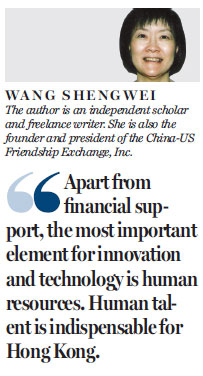Chief Executive's HK$4.7 billion silver bullet will boost our city
Updated: 2016-01-19 08:49
By Wang Shengwei(HK Edition)
|
|||||||||
Thinking people who appreciate the host of advantages Hong Kong provides for its residents are hailing the latest plans unveiled in Chief Executive Leung Chun-ying's Policy Address. Following the establishment of the Innovation and Technology Bureau (ITB) in November 2015, he announced his commitment to the city's economic development of innovative technology through the injection of a silver bullet of at least HK$4.7 billion by establishing four funds. This is for research startups, universities and Cyberport to promote science and technology.
We should embrace this major policy initiative amid the current economic downturn - with mainland tourists staying away, the Hang Seng index dropping below 20,000 and mainland stocks falling more sharply. Additionally, Hong Kong is facing strong competition from Guangzhou; its 2015 GDP may surpass our city's, as did Beijing's and Shanghai's in 2009 and 2011, respectively.
Moreover, our overall expenditure on technological research has always been minuscule. Over the past five years, it amounted to only 0.7 percent of GDP. Our city desperately needs a new driving force to boost its economy. It is hoped that scientific research will stimulate GDP growth from the current figure of less than 0.5 percent to 1 percent.
Specifically, the government will set aside HK$2 billion to create an Innovation and Technology Venture Fund for co-investing in private venture capital funds on a matching basis. The matching fund aims to attract international venture capitalists to invest in startups in Hong Kong. This is in addition to the major funding initiative under the Innovation and Technology Fund operated by the Innovation and Technology Committee. This aims to encourage universities and the private sector to invest in research and development.
The government will also set aside another HK$2 billion from the above investment returns. This will be held by the ITB to fund university midstream or applied research results that can be turned into products. It will enhance the atmosphere for science and technology research in Hong Kong. This additional new funding will be totally independent from the operation of the Research Grants Council established for academic research work, so university research teams can do basic research as well as generate industrial applications.
Already there are successful examples: Cheah Kok-wai, physics chair professor of Hong Kong Baptist University (HKBU) and his team have developed Armo Glass, a new material, and a layer of nano-materials that have ultra-hard and anti-scratch properties and can be deposited onto a transparent substrate, ideal for use on touchscreen devices. The team has established a company in Wong Tai Sin. Another HKBU Physics Professor, Cheung Nai-ho, and his former PhD student, Bruno Cai, have developed a laser technique that can sensitively analyze the chemistry of artwork, achieving 100 to 1,000 times better sensitivity than current methods. The technology has been granted a US patent and a company set up to collaborate with local and overseas museums/institutes and private collectors to analyze antiques, paintings, ceramics, frescoes and other art objects.
In addition, Cyberport will allocate HK$200 million to launch a Cyberport Macro Fund for investment in its information and communications technology startups.
The Policy Address also earmarked HK$500 million to set up the Techtronic Life Fund that will finance applied techtronic projects to improve people's daily lives, especially in communications, transportation, medicine and education. In short, the ITB will strive to make Hong Kong a smart city. Other proposals include doubling the number of Wi-Fi hotspots in the city to 34,000 in three years, making Hong Kong one of the world's most concentrated Wi-Fi areas, developing a big-data applications policy and creating intelligent homes. The government also wants to apply science and technology in centers for seniors.
But we must remember that, apart from financial support, the most important element for innovation and technology is human resources. Human talent is indispensable for Hong Kong. Our educational system must nurture and incubate creative thinking. Therefore, the core value of our university education must be cultivation of independent thinking so that, after four years, graduates will be willing and able to tackle any unforeseen challenge in life and use their science and technology knowledge to discover good and workable solutions.
Finally, we must not repeat the mistake made a few years ago that caused Frank Wang Tao to leave Hong Kong and headquarter his drone company DJI in Shenzhen.

(HK Edition 01/19/2016 page9)